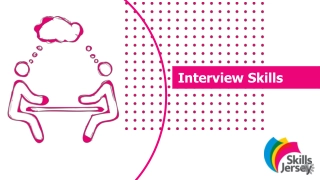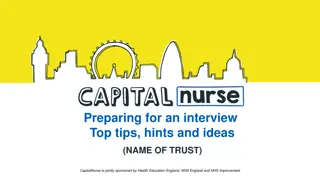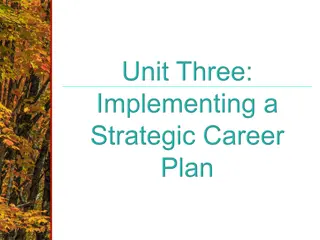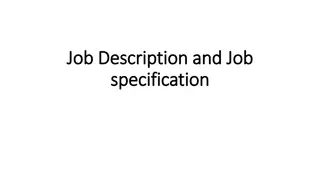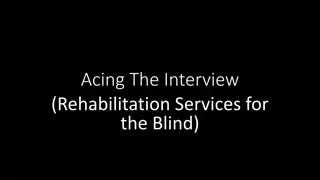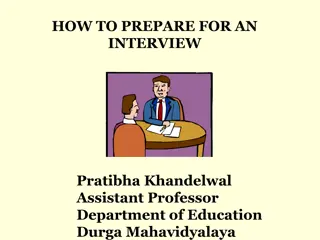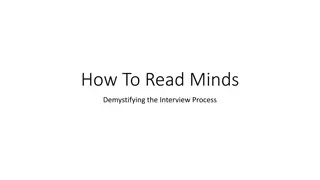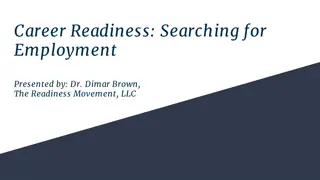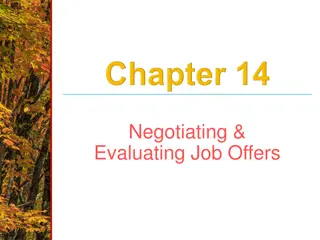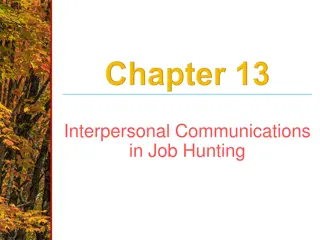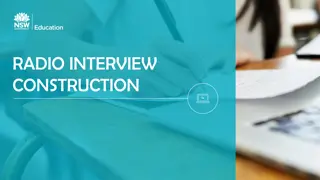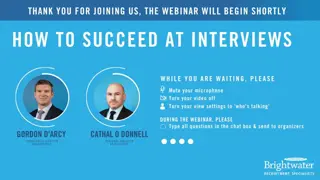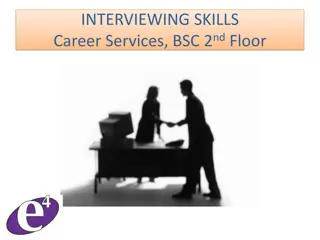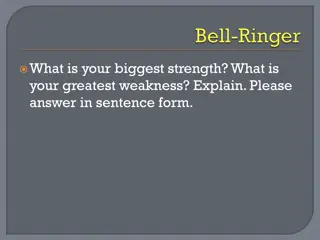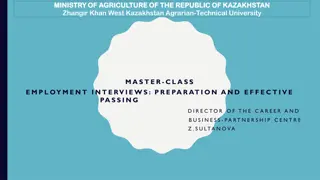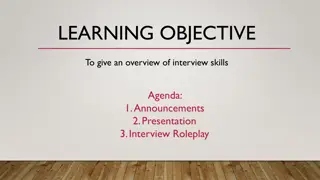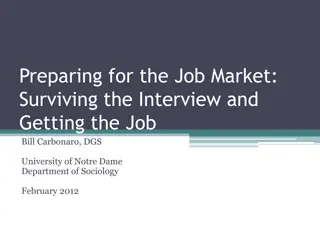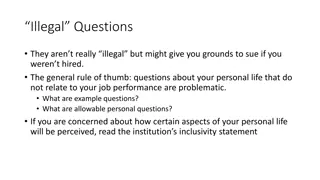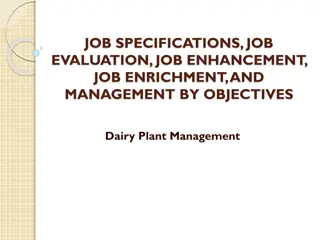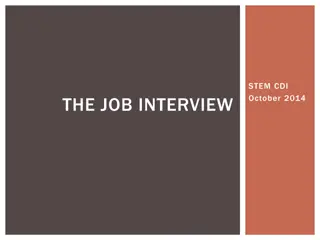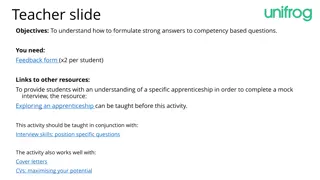Creating Effective Interview Questions for Job Interview Success
Enhance your interview process by creating work-related questions that challenge candidates and provide valuable insights. Learn how to identify key competencies, craft behavioral interview questions, and set clear criteria to attract top talent. Gain valuable tips from a case study of an HR Specialist in talent acquisition. Elevate your recruitment strategy to find the best fit for your organization.
Download Presentation

Please find below an Image/Link to download the presentation.
The content on the website is provided AS IS for your information and personal use only. It may not be sold, licensed, or shared on other websites without obtaining consent from the author. Download presentation by click this link. If you encounter any issues during the download, it is possible that the publisher has removed the file from their server.
E N D
Presentation Transcript
Friday Microlearning Creating Interview Questions
Goal Create effective interview questions with a focus on work-related questions that are harder to prepare for and to fake an answer to.
How to Create Effective Interview Questions 1. Choose the most important attributes (competencies/KSAs and experience) that are required to be effective in the job for which you are interviewing. 2. Gather questions from each of the selected competencies to create your list of interview questions.
How to Create Effective Interview Questions Understand the job: KSA and experience relates to the essential functions Behavioral Interview and patterned interview Patterned Interview: carefully selecting questions and determining acceptable answers ahead of time greatly increases chances of success Behavioral Interview: focus on how Committee s participation and understanding applicants describe either past or anticipated Objective, quantifiable future behavior.
Identify the Criteria Develop a clear position description that include essential functions, qualifications and experience but don t make it so specific that it inadvertently deters highly qualified applicants. Think carefully about the qualifications listed, what is required and what is preferred. Define broad yet clear criteria around the qualifications. Get input/suggestion from a diverse interview committee (multiple perspectives). Include the customer of the position to the committee.
Case Study: Identify Criteria HR Specialist-Talent Acquisition Essential Duties: Conduct life cycle recruiting to attract top talent: sourcing, screening, interviewing and offering. Review position descriptions to make sure the representative duties, knowledge, skills and abilities (KSA) are pertinent to the essential functions of the positions and remove any exclusionary language, artificial barriers, unnecessary qualifications. Support managers through the applicant tracking system, workflows and related recruitment policies. Organize, and implement outreach efforts (college recruitment, diversity recruitment etc.). Develop and implement advertising and social media recruitment strategies Participate in salary survey and HR reports as needed. ...... Minimum Qualifications: Any combination equivalent to: a Bachelor s degree in Human Resources, Business Administration, Management, Marketing, or related field and three years of in-house human resources experience some of which includes recruiting and sourcing.
Case Study: Identify Criteria HR Specialist-Talent Acquisition Criteria 1. In house HR experience, with recruitment experience 2. Full cycle recruitment experience 3. Experience reviewing position descriptions 4. Experience with applicant tracking systems 5. Advertising and branding strategies 6. Outreaching skills 7. Compensation knowledge and data analysis/reporting experience 8.
Gather Questions (Templates/Samples) Google Interview Questions and you will get thousands of samples, e.g.: 1. LinkedIn: 30 behavioral interview questions to assess soft skills https://business.linkedin.com/talent-solutions/resources/interviewing-talent/behavioral-interview-questions-important-soft-skills 2. SHRM https://www.shrm.org/ResourcesAndTools/tools-and-samples/interview-questions/Pages/default.aspx ChatGPT Interview Questions For Student Success Counselor https://chat.openai.com/share/d182c0f6-6fff-4849-a5f2-c0e9266c7c3d Previous Search/ Similar Searches Contact HR for more information. Committee members input
Behavioral/Situational Questions 1. Behavioral: An interview technique that focuses on a candidate's past experiences, behaviors, knowledge, skills and abilities by asking the candidate to provide specific examples of when he or she has demonstrated certain behaviors or skills as a means of predicting future behavior and performance. 2. Situational: An interview technique that gives the interviewee a hypothetical scenario and focuses on a candidate's past experiences, behaviors, knowledge, skills and abilities by asking the candidate to provide specific examples of how the candidate would respond given the situation described.
Behavioral/Situational Questions Example: Problem-solving/Analysis Behavioral Describe a time when you were able to overcome a communications barrier(s). Situational Two members of a team do great work, but they do not work well together. What are some of the key ways to get them to work together better?
Tips for Interview Questions That Result in Great Hires 1. Legality 2. Fit 3. Avoid easy-to-practice questions. 4. Assess their ability to solve a problem 5. Evaluate whether they re forward-looking 6. Assess a candidate s ability to learn, adapt, and innovate. 7. Be wary of historical questions 8. Avoid Duplication
Tips for Interview Questions That Result in Great Hires 1. Legality Marital status or children. Ban-the box . Outside activities or hobbies might indicate race. religion, national origin, sex, age, etc. Gender/sex. Languages, unless job requires a certain language fluency. Salary history. Education, if asking about graduation year. Experience working with a group of female colleagues . Creating implied employment contract.
Tips for Interview Questions That Result in Great Hires 3. Avoid easy-to-practice questions What are your greatest strengths and weaknesses? What is your dream job? Why are you the best candidate? 8. Be wary of historical questions Good experience years ago might be wrong answer today Good story teller
Tips for Interview Questions That Result in Great Hires 4. Assess their ability to solve a problem Consider to ask them: Identify the problem on the job Solve a current problem. Identify the problem in our process For example: HR Specialist-Talent Acquisition: We lack of applicants for most of positions. Please walk us through the broad steps you would take in order to solve the problem.
Tips for Interview Questions That Result in Great Hires 6. Assess a candidate s ability to learn, adapt, and innovate. Consider to ask them: Out line the steps you d like to learn/take to adapt/increase innovation 2. FIT . Not too easy, not too complicated; think of what the position really needs Not too specific, not too broad Not too long, not too short, 8-10 questions for a 40 minutes interview Avoid duplication
HR Specialist-Talent Acquisition 1. Please give an overview of your education and professional development experiences related to the areas of personnel selection, organizational development, classification, and compensation. 2. If you are hired to this position, please share the plan how you can learn the position and the community in the first 3 to 6 months. 3. Describe your experience coaching hiring managers/search committees to develop interview criteria. 4. How would you improve our employment brand? Discuss your outreach/recruitment experience to attract a diverse applicant pool. 5. Describe your experience reviewing Position Descriptions... what did you regard as the key issues to consider and mistakes to avoid? 6. Explain a previous situation where you were working with an upset hiring manager. What was the problem at hand, and how did you resolve the issue? 7. Tell us about any reports you have generated and how your determine their accuracy. 8. We lack of applicants for most of positions. Please walk us through the broad steps you would take in order to solve the problem.

 undefined
undefined




